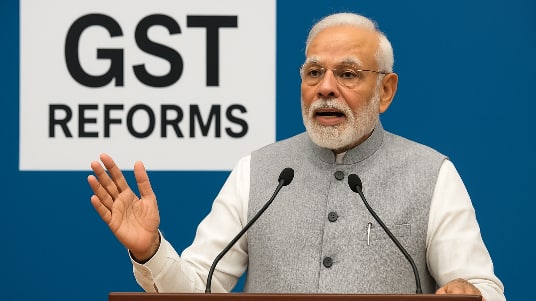Sanjiv Puri from ITC said that the reforms will also promote ease and cost of doing business through a transparent, simplified and growth-boosting tax structure enabling enterprises to be more competitive and agile in a fast-evolving business environment.

GST
Praising the GST reform measures announced in Prime Minister Narendra Modi’s 79th Independence Day address, industry leaders such as Sanjiv Puri, Chairman of ITC Ltd, and Mohit Malhotra, CEO of Dabur International, said the new GST structure will boost consumption and, in turn, provide a strong push to the macroeconomy.
Sharing thoughts on the same, Sanjiv Puri said, the new GSDT structure will spur virtuous cycle of consumption, investment, growth and employment.
He said, “The Hon’ble Prime Minister’s vision to unleash next generation reforms especially in the GST framework is far-sighted and will spur a virtuous cycle of consumption, investment, growth and employment. The Government’s resolve to ensure ease of living by enhancing affordability and accessibility of all items meant for daily consumption, including foods, for a large section of society will benefit the sizeable middle-class population, MSME’s and farmers.”
He added that the reforms will also promote ease and cost of doing business through a transparent, simplified and growth-boosting tax structure enabling enterprises to be more competitive and agile in a fast-evolving business environment.
Puri highlighted that the proposed measures will also enable the formalization of the economy and a tax compliant society.
“The next generation reforms will undoubtedly strengthen the foundations of Atmanirbhar Bharat, fuel the spirit of enterprise, enable youth to pursue better opportunities and contribute substantially as India traverses a momentous journey to a Viksit Bharat,” he said.
Likewise, Dabur International’s CEO, Mohit Malhotra said the announced GST reforms will improve festive purchasing power of Indian families.
“As the festive season approaches, this move will help improve sentiments and put more purchasing power directly into the hands of millions of Indian families. This is more than just a policy shift, it’s a signal of confidence in India’s consumption story. It will energize demand, ease the burden on households and catalyze growth for branded FMCG products.” Malhotra said.
It is to be noted that, to build an ‘Atmanirbhar Bharat’, the Central Government has proposed significant reforms in GST. The proposed reforms are focused on three pillars, namely: a) structural reforms b) rate rationalisation, and c) ease of living
The Central Government has sent its proposal on GST rate rationalisation and reforms to the Group of Ministers (GoM) constituted by the GST Council to examine this issue.
Key areas identified for next-generation reforms include the rationalisation of tax rates to benefit all sections of society, especially the common man, women, students, middle class, and farmers.
Reforms will also seek to reduce classification-related disputes, correcting inverted duty structures in specific sectors, ensuring greater rate stability, and further enhancing ease of doing business. These measures aim to strengthen key economic sectors, stimulate economic activity, and enable sectoral expansion.
Empower your business. Get practical tips, market insights, and growth strategies delivered to your inbox
By continuing you agree to our Privacy Policy & Terms & Conditions
